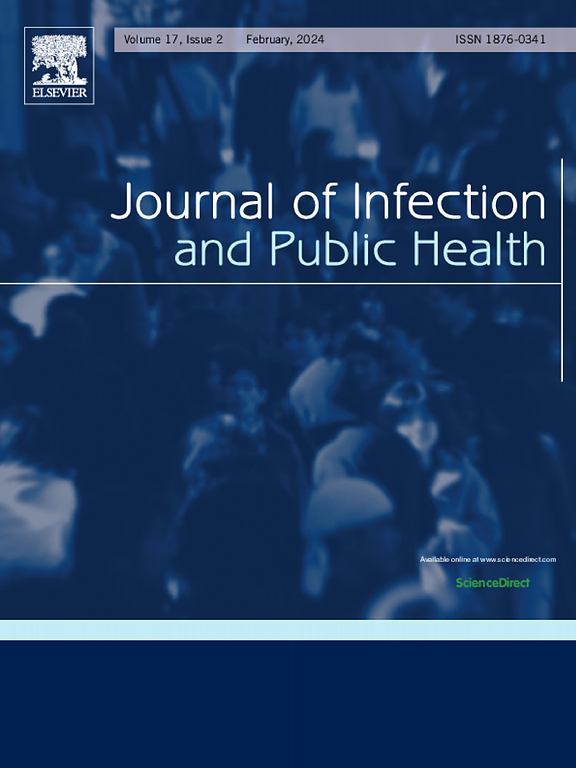担子孢子菌病的单中心回顾性研究:特征、管理和结果
IF 4
3区 医学
Q1 INFECTIOUS DISEASES
引用次数: 0
摘要
胃肠道担子孢子菌病(GIB)是一种罕见的真菌感染,由担子孢子菌引起,主要影响热带地区的儿童,并经常模仿其他疾病,导致诊断延误。本研究回顾性分析了2013年至2023年在沙特阿拉伯三级医疗中心诊断的9例小儿GIB病例。患者的中位年龄为5岁,腹部症状是最常见的表现(77.7% %)。实验室结果包括白细胞增多、嗜酸性粒细胞增多和炎症标志物升高。升结肠是最常见的受累部位(44.4% %)。组织病理学检查证实所有病例均有真菌成分。所有患者均接受伏立康唑治疗;22.2% 同时使用伏立康唑和伊曲康唑。平均治疗时间为16个月。44.4% %的患者完全缓解,而22.2% %的患者失去随访,22.2% %的患者仍在接受治疗。GIB需要高度的怀疑指数,特别是在腹部肿块和嗜酸性粒细胞增多的患者。使用微创方法进行诊断和抗真菌治疗,特别是伏立康唑为基础的治疗方案,似乎对治疗这种疾病有效。本文章由计算机程序翻译,如有差异,请以英文原文为准。
Single-center retrospective study on Basidiobolomycosis: Characteristics, management, and outcomes
Gastrointestinal basidiobolomycosis (GIB), a rare fungal infection caused by Basidiobolus ranarum, primarily affects children in tropical regions and often mimics other conditions, leading to delayed diagnosis. This study retrospectively analyzes nine pediatric cases of GIB diagnosed between 2013 and 2023 at a tertiary care center in Saudi Arabia. Patients had a median age of five years, with abdominal symptoms being the most common presentation (77.7 %). Laboratory findings included leukocytosis, eosinophilia, and elevated inflammatory markers. The ascending colon was the most frequently affected site (44.4 %). Histopathological examination confirmed fungal elements in all cases. All patients received voriconazole; 22.2 % were treated with both voriconazole and itraconazole. The mean treatment duration was 16 months. Complete resolution was achieved in 44.4 % of patients, while 22.2 % were lost to follow-up, and 22.2 % remained under treatment. GIB requires a high index of suspicion, particularly in patients with abdominal masses and eosinophilia. Diagnosis using minimally invasive methods and antifungal therapy, particularly voriconazole-based regimens, appear effective in managing this condition.
求助全文
通过发布文献求助,成功后即可免费获取论文全文。
去求助
来源期刊

Journal of Infection and Public Health
PUBLIC, ENVIRONMENTAL & OCCUPATIONAL HEALTH -INFECTIOUS DISEASES
CiteScore
13.10
自引率
1.50%
发文量
203
审稿时长
96 days
期刊介绍:
The Journal of Infection and Public Health, first official journal of the Saudi Arabian Ministry of National Guard Health Affairs, King Saud Bin Abdulaziz University for Health Sciences and the Saudi Association for Public Health, aims to be the foremost scientific, peer-reviewed journal encompassing infection prevention and control, microbiology, infectious diseases, public health and the application of healthcare epidemiology to the evaluation of health outcomes. The point of view of the journal is that infection and public health are closely intertwined and that advances in one area will have positive consequences on the other.
The journal will be useful to all health professionals who are partners in the management of patients with communicable diseases, keeping them up to date. The journal is proud to have an international and diverse editorial board that will assist and facilitate the publication of articles that reflect a global view on infection control and public health, as well as emphasizing our focus on supporting the needs of public health practitioners.
It is our aim to improve healthcare by reducing risk of infection and related adverse outcomes by critical review, selection, and dissemination of new and relevant information in the field of infection control, public health and infectious diseases in all healthcare settings and the community.
 求助内容:
求助内容: 应助结果提醒方式:
应助结果提醒方式:


